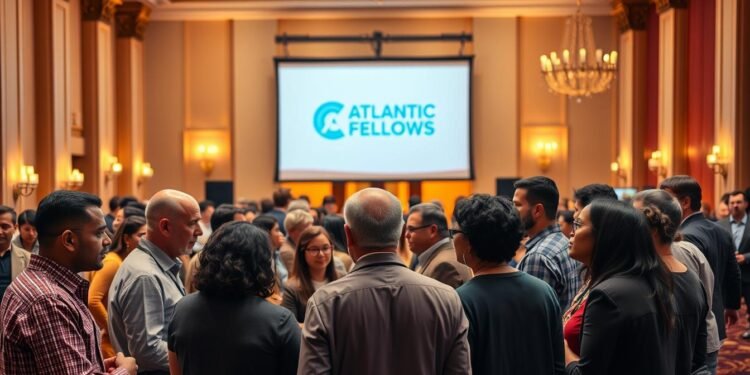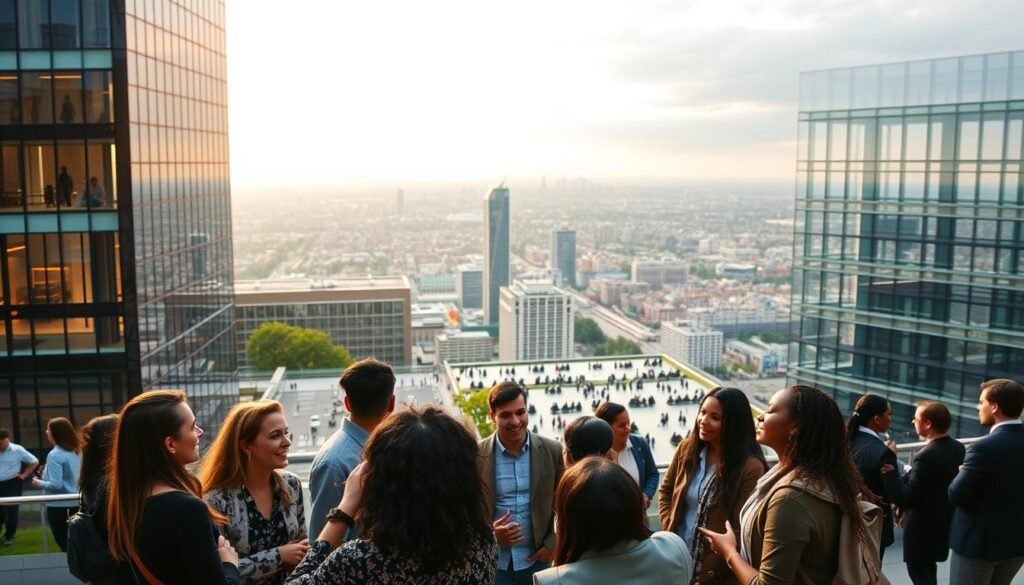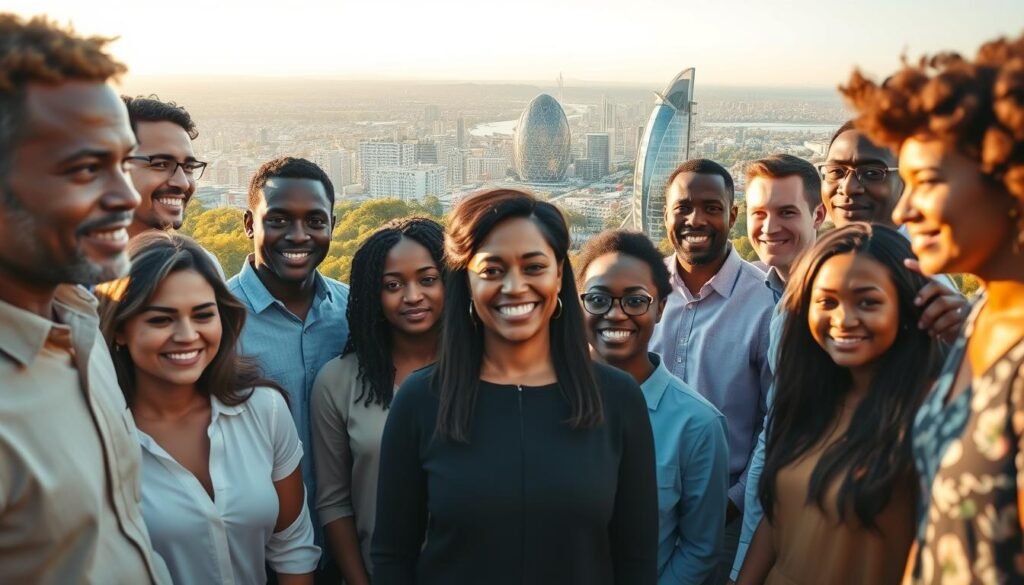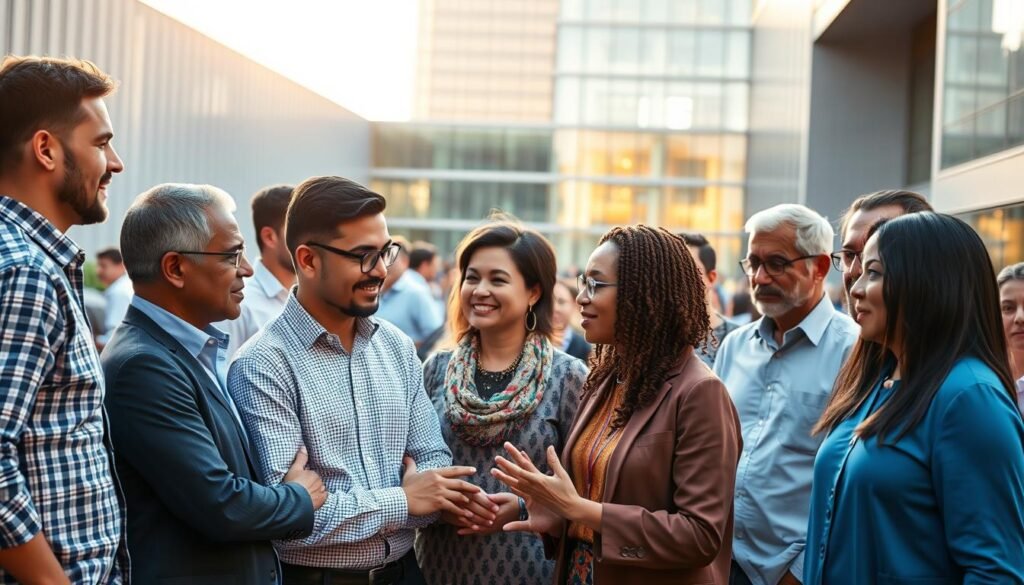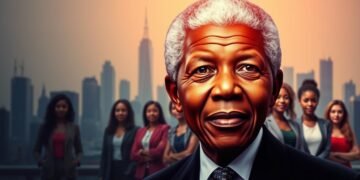What does it take to create lasting change in a world filled with systemic inequality? The Atlantic Fellows for Social and Economic Equity program offers a compelling answer. Based at the London School of Economics, this global leadership initiative brings together visionaries from over 80 countries to tackle pressing issues of equity and justice.
With 943 active Fellows, the program is a hub for collective action. Leaders like Louise Russell-Prywata and Alon-Lee Green are driving transformative projects worldwide. Their work combines academic research with real-world activism, creating a powerful force for change.
Applications for the next cohort open in October 2025. If you’re passionate about addressing inequality, this could be your opportunity to join a network of changemakers. The program aims to grow its impact, with plans to support over 2,700 Fellows in the coming decades.
Key Takeaways
- The program is based at the London School of Economics.
- It focuses on combating systemic inequality through collective action.
- There are currently 943 Fellows from over 80 countries.
- Applications for the next cohort open in October 2025.
- Prominent Fellows include Louise Russell-Prywata and Alon-Lee Green.
- The program combines academic research with real-world activism.
Introduction to the Atlantic Fellows Program
Addressing systemic challenges requires innovative solutions and collaboration. The Atlantic Fellows program, founded through a partnership with the Atlantic Institute, is a prime example of such efforts. It brings together leaders from around the world to tackle pressing issues of equity and justice.
This initiative includes seven interconnected global programs. Among them are the Social & Economic Equity program in London and the Racial Equity program in New York and Johannesburg. Each program focuses on specific areas, such as Health Equity in Southeast Asia, based in Bangkok.
The 12-month curriculum blends theoretical frameworks with practical skill-building. Fellows engage in leadership development while exploring innovative tools like the XR Lab. This lab uses augmented reality to enhance storytelling for social impact.
Recently, Lysa John, former leader of CIVICUS, was appointed as the Executive Director. Her expertise in global advocacy aligns perfectly with the program’s mission to empower changemakers worldwide.
Purpose of the Atlantic Fellows for Social and Economic Equity
Transformative social change requires both vision and actionable strategies. The program empowers leaders to address systemic inequities while fostering individual growth. By combining academic rigor with practical tools, it creates a pathway for meaningful impact.
Empowering Change-Makers
The program focuses on equipping leaders with the skills and experience needed to drive social change. Fellows like Adekemi Adeniyan, who won the 2025 Roux Prize, have implemented data-driven solutions to improve oral health in Nigeria. Similarly, Shatyam Issur uses XR storytelling to address climate equity.
Another notable initiative is the “Augmented Artifact” project. This collaboration across seven programs uses augmented reality to preserve Indigenous cultures and amplify their voices. These efforts highlight the program’s commitment to fostering innovation and equity.
Building Knowledge and Skills
The curriculum emphasizes both individual leadership and systemic change. Fellows engage in policy analysis frameworks, movement-building strategies, and intersectional equity frameworks. These components ensure they are well-prepared to tackle complex challenges.
Recent articles by Fellows in 2025 explore topics like reparations and power dynamics in social change. These contributions reflect the program’s dedication to advancing knowledge and justice. By blending theory with practice, it creates a community of leaders ready to shape a fairer world.
Building a Global Community of Leaders
Creating a fairer world demands collective effort and innovative leadership. The program connects visionaries across geographic, disciplinary, and career boundaries. This global network fosters collaboration and drives meaningful change.
Catalytic Communities
The “catalytic communities” model brings together leaders from diverse backgrounds. From Melbourne to San Francisco, these networks span the globe. They unite professionals in healthcare, environmental justice, and beyond.
Emerging leaders and seasoned policymakers collaborate to address systemic challenges. This approach ensures that expertise is shared across generations. The result is a dynamic ecosystem of innovation and equity.
Generational Impact
Intergenerational mentorship is a cornerstone of the program. Seasoned leaders guide emerging changemakers, fostering growth and continuity. This exchange of knowledge amplifies the program’s impact.
Measurable outcomes include policy changes in 15+ countries. Over 60% of alumni lead social justice organizations. Initiatives like the 2025 Climate Action & Power project unite 47 leaders across six continents.
By 2045, the program aims to support over 2,700 leaders. Cross-program collaborations, such as the Emerging Technology Health Residency, further expand its reach. Partnerships through the Atlantic Institute offer additional opportunities for organizations to engage.
Conclusion
Building a better future starts with empowering leaders who drive meaningful change. This initiative stands at the intersection of academia and activism, offering a unique platform for tackling systemic challenges. With multiple pathways across seven programs, individuals can explore opportunities in areas like Social & Economic Equity in London or Health Equity Global in Washington D.C.
Engagement opportunities abound. Subscribe to the “Amplifying Voices” newsletter to stay updated. Attend public lectures by inspiring leaders like Crystal Simeoni, who focuses on economic justice. Organizations can also partner through corporate social responsibility initiatives to amplify their impact.
Applications for the 2025 cohort open in October and close in January. As Fellow Roseline Orwa aptly puts it, “Equity work is the oxygen of human dignity.” Join this global community and be part of shaping a fairer world.
FAQ
What is the Atlantic Fellows program?
The Atlantic Fellows program is a global initiative focused on empowering leaders to drive social and economic equity. It provides resources, knowledge, and networks to create lasting change.
Who can apply to become an Atlantic Fellow?
Emerging leaders from diverse backgrounds who are committed to advancing fairness and inclusivity in their communities are encouraged to apply. The program seeks individuals with a passion for social justice and sustainability.
What skills and knowledge do Fellows gain?
Fellows develop expertise in public policy, leadership, and community building. They also gain tools to address inequality and create impactful solutions for fairer societies.
How does the program support generational impact?
By fostering catalytic communities, the program connects leaders across generations. This ensures that knowledge and strategies for equity are shared and sustained over time.
What is the focus of the Atlantic Fellows for Social and Economic Equity?
The focus is on addressing systemic inequality through education, leadership development, and collaborative efforts. Fellows work to advance fairer and more inclusive societies globally.
How does the program contribute to global change?
By building a network of skilled leaders, the program amplifies efforts to tackle pressing issues like land rights, health equity, and economic justice. This collective action drives meaningful and lasting impact.

